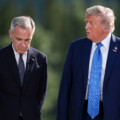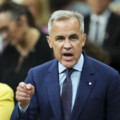TORONTO – Since Hamas’ terrorist attacks and Israel’s ensuing response, world leaders and political figures have weighed in on the conflict, including some whose statements have offered strong support to Israel at a time when antisemitism and attacks on Jewish people and businesses are on the rise. These expressions of political support stand in contrast with the scenes of protests and rallies around the world. Here are five tweets that demonstrate support for Israel’s cause from global leaders across the political spectrum.
Pierre Poilievre, leader of the federal Conservative Party, has been a consistent voice in support of Israel and against antisemitism, including a November 4th statement that condemned antisemitic demonstrations such as the display of a swastika on Parliament Hill.
Former U.S. Democratic presidential candidate Hillary Clinton expressed strong support for Israel during an appearance on the popular television show, The View. The eight-and-a-half-minute clip that draws on her experience as a former secretary of state has been widely shared on social media.
Democratic Senator John Fetterman from Pennsylvania has similarly been a staunch supporter of Israel. Foreign policy wasn’t a major factor behind his election in 2022 and he’s had various issues and challenges since he joined the senate, but he’s emerged as a major senatorial voice in response to the Israel-Hamas war.
Democratic Senator Bernie Sanders has also been a stalwart supporter of Israel including objecting to calls for a ceasefire. This has distinguished him from other progressive voices who have expressed support for Palestine and criticism of Israel.
One of the most strident messages in support of Israel comes from Germany’s vice chancellor, Robert Habeck, which draws on his country’s complicated history to make a principled case in favour of supporting Israel and condemning antisemitism.
Habeck’s remarks have been characterized by political scientist (and former Hub Dialogues guest) Ian Bremmer as well as others as a voice of leadership.

If you enjoy Hub podcasts (including bi-weekly episodes with David Frum and Amanda Lang), be sure to check out more insightful commentary on The Hub’s YouTube page:
Recommended for You

Kirk LaPointe: B.C.’s ferry fiasco is a perfectly Canadian controversy

‘I want to make Canada a freer country’: Conservative MP Andrew Lawton talks being a newbie in Parliament, patriotism, and Pierre Poilievre’s strategy

‘Putin has no intention of stopping this war’: Sir Bill Browder on three years of war in Ukraine and how Russia is evading sanctions

The Notebook by Theo Argitis: Trump halts trade talks, Carney’s trade-offs and John McCallum’s legacy



